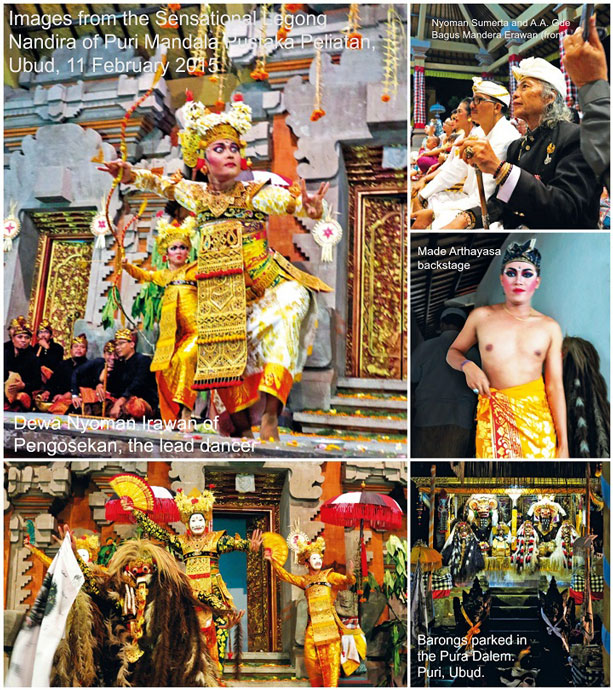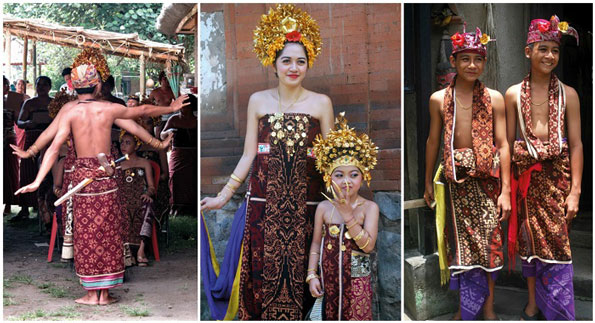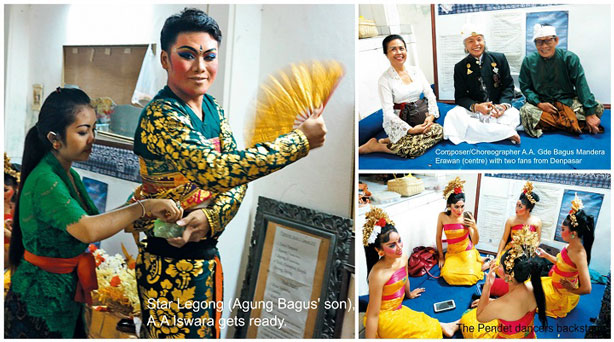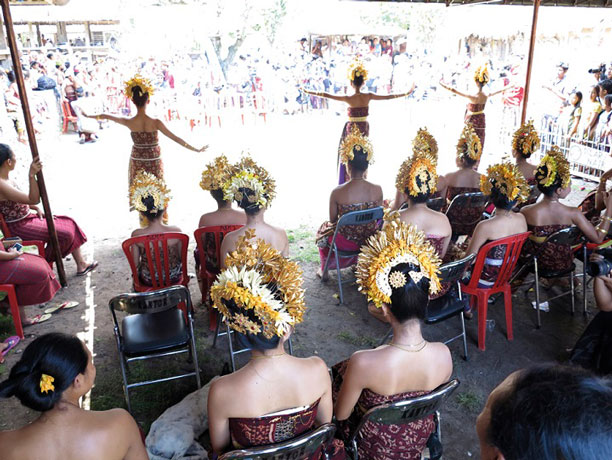Even the poor Aussies on death row got a riotous send off with an extraordinarily honour guard in black masks, a pair of Barracuda armoured vehicles and an air escort of Sukhoi fighter jets.
All my cups are chipped. I am sun-damaged. These are the silly thoughts that pop into an old diarist’s head when he sits down to write his monthly column about the island he loves and realizes he doesn’t. Well, not the brutal bits that come with the transport of my countrymen to ‘Execution Island’, as the BBC are calling it. There has been so much adverse publicity that people may start calling Bali ‘Execution Island’ if the authorities are not careful.
In an unrelated development, my Balinese guru, police captain (ret.) Wayan Surpha died last month. He helped me and many other expatriate Bali-lovers become Hindu in the 1970s when he was head of the Parisadha Hindu Dharma (the Hindu Bali See), and simultaneously head of intelligence at the Denpasar Police headquarters. He is famous for once pulling a gun on customs at Denpasar airport when the BBC film crew — here to shoot the once-every-hundred-years Eka Dasa Rudra ceremony at Pura Besakih — were being harassed. He always injected a bit of the steely-eyed detective into his religious duties, and a heap of Buddhist compassion into his police work.
“Wayan Surpha
1 May 1935 – 5 March 2015″
His cremation brought together the best of Balinese society — senior representatives of both law and law enforcement. It was a joyous affair, as Balinese send-offs always are — the Balinese love a parade.
Even the poor Aussies on death row got a riotous send-off with an extraordinary honour guard in black masks, a pair of Barracuda armoured vehicles, and an air escort of Sukhoi fighter jets.
Pak Surpha, bless his soul, is more deserving.
To balance the urban Bali blues I took myself twice last month to the magical rural village of Tenganan in East Bali. I was invited for the Abuang Lemah ritual — a teenage acquaintanceship ritual — when the village fills up with photographers and exquisitely-dressed teenagers sway and swivel in heavily orchestrated pas de deux. The hypnotic Tenganan selonding ensemble plays in the sacred long pavilion that forms a backdrop for the rituals.
Famed Swiss anthropologist Urs Ramseyer, now retired and playing the saxophone in Basel, wrote a book called The Cosmic Theatre of Tenganan. It described the extraordinary rituals and theatrical ceremonies that make up the exquisite village’s year.
The Tenganese are so civilized that they dot the village’s public spaces with pavilions for afternoon palm-toddy parties (afternoon starts at about 3 p.m.). On feast days, like the one I attended, the villagers chop pork-meat in the long pavilion while guests from neighbouring villages are entertained, pre-lunch, in these small entertainment pavilions, with copious jugs of the palm-toddy, and pork crackling while they watch the teenagers twist and twirl.
See video: http://youtu.be/QnCvuPhw0eI
5 March 2015: Back to Tenganan for a Friend’s coming-of-age ceremony
I met Kadek Budi Juniantara at last year’s Tenganan gladiator event. He distinguished himself at his father’s food stall after his bout by chatting up the prettiest of the groupies with blood streaming down his back. I liked the way his feet moved in his flip-flops, like Usain Bolt’s from his starting-blocks. The segment with his foot in it got the most likes on YouTube.
Teenagers perform the abuang ‘Getting to know you’ ritual

Kadek works as a bartender at Slipping Stone in Seminyak, where he gets all the girls (he’s kind of goofy and gorgeous in equal measure, which the girls love).
It is forbidden for the Tenganese to marry outside the smallish village, so any girlfriends know where they stand. Indulging in premarital sex is also forbidden —the strict puberty ritual takes a year, with all teenage boys in purdah — but Balinese love to bend the rules (don’t tell Professor Ramseyer).
Recently, Kadek wanted to leave all this fun and games behind and join a cruise ship in the Caribbean. ‘Are you out of your mind’, I counselled him. ‘You are so lucky to be born Tengananese, don’t miss a second of it’. He agreed. It’s a hideous life on the cruise ships, anyway. The brain drain of bright Balinese to these bloody cruise-ships has reached epidemic proportions.

” Teenage girls lure the boys during the Abuang Lemah ritual, Tenganan“
Today I arrived with a gang of Denpasar palace princes on our way to a Brahman body-washing in Sidemen (that’s a good line). They absolutely love to be inside a Tenganan house in full ceremonial swing. All the girls and ladies are in ancient costume and look stunning. The offerings are unique and the atmosphere very chip-chop (Aunties rule with iron fists).
It turns out that the ceremony, called mayahin, is for repaying the karmic debt to one’s paternal ancestors, in this case Kadek’s grandfather.
The climax of the ritual is the breaking of the sotan, a loop of white string, which symbolizes the contract of ‘debt’.
After the ceremony we all joined in the magibung ritual where one shares with a small circle of friends a pile of food on a banana leaf.
See video: http://youtu.be/SRIWW5wEd2M
8 March, 2015: The tyranny of Facebook censorship raises its ugly head
I have, this morning, a Sunday morning — when after 8 hours sleep I am at my most feisty — been banned from further comments on the MAJAPAHIT Facebook page I adore ( 32,000 followers).
This page is not by any means the pre-eminent discussion forum on that great and now widely popular East Javanese Hindu Empire (approx 1250 – 1550 C.E.) — that would be my MAJAPAHIT JAVA BALI page, with 320 followers — but all the amateur archeologists and historians around do occasionally throw up some unique material.
I am a big fan of Majapahit — Bali did inherit the mantle — and I recently published a 350-page book on the subject (Majapahit Style, available at a Ganesha bookstore near you). The book has had good reviews and, most importantly, been well-received in the academic community (that venomous snake pit called MAJAPAHIT SCHOLARS ANONYMOUS).
I am at present having the book translated into Indonesian and am posting it, chapter by chapter, as they are completed, on my Majapahit Java Bali Facebook page, both to promote discussion, and so that the 32,000 odd members can comment. Of course no-one has commented yet — the Javanese scholars are shy and the Balinese scholars have a limited attention span due to the fact that their time is taken up with living the Majapahit culture.
The 32,000 mostly Javanese amateur academics on the MAJAPAHIT Facebook page are prone to jingoism of the worst kind — the uneducated and unscientific kind — and I, as the little Ozzie battler in the herd of the imperturbable, often feel the urge to take them on.
Why?
Because:
1. They need a bit of confrontation (anathema to the Javanese soul) especially the confronting of spurious facts;
2. Majapahit is hallowed turf — on a par with Mecca, it sometimes seems so confronting is a bit of a blood sport, and I am a sportsman;
3. The late President Soeharto’s spin-doctors did a great job of weaving Majapahit into the nationalist rhetoric: the concept of Nusantara Indah was invented (our beautiful Archipelago, which of course it is) and all you separatists can die die die. The Javanese sense of Majapahit ownership brokers no threats — it perhaps hurts the local scholars’ pride that nearly all the great Majapahit scholars have been, and continue to be, foreigners — especially as Majapahit has become synonymous with anti-colonialism.
I tell you all this because I sense that you are all tired of hearing about how beautiful Tenganan is and perhaps want to hear what’s really going on, for once.
This morning I challenged one poster on his assertion that Majapahit gamelan was the greatest music ever (not that anyone REALLY knows what it was like back then), as was the empire. I reminded the poster of the great Austro-Hungarian empire and its royal patronage of Mozart, Liszt, and Schubert (to name a few) and of the greatness of the Mughal and Khmer empires.
Well, it was as if I’d burned a flag — outrage rained down. I was called an overheated water-buffalo straying onto the field.
Within seconds my Javanese artist friend Jumaadi Jumaadi in Sydney, who is married to Irish-Australian Majapahit scholar Dr Siobhan Campbell, swung to my defense and called them racists.
I thanked him, in a post, for his help, and went on to explain that, really, I liked any attention, as so often our comrades down the coast (the Javanese intellectuals) respond like sea anemones when prodded. I went on, rather recklessly, to use the expression ‘Fairies of the Fatwa’, because it sounded too good not to use, and because it alludes to their precious Jingoism.
Minutes later we are both blocked by the site’s admin. A melée has yet to break out.
More news on this exciting Facebook development next month: in the meantime, please buy my book.
STOP PRESS: False alarm: Jumaadi and I are not blocked, just our comments removed and then the thread wiped. But it made a good yarn.













